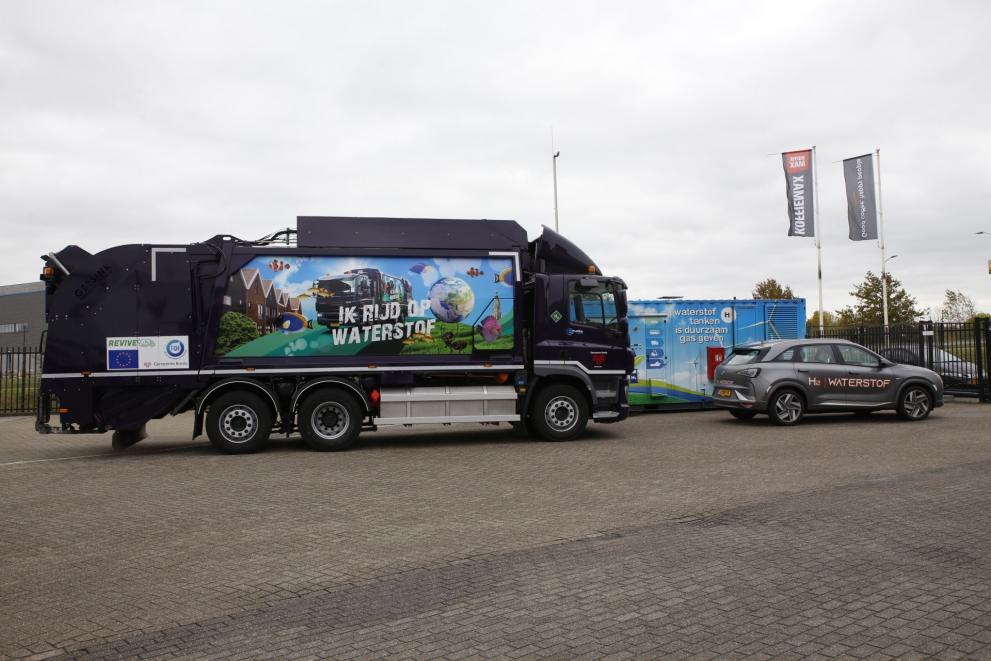
The REVIVE (Refuse Vehicle Innovation and Validation in Europe) project, co-financed by the Fuel Cells and Hydrogen Joint Undertaking (FCH JU), is pleased to announce the start of operation of a fuel cell refuse truck in Breda, The Netherlands, supported by an Interreg-funded refuelling station as part of Hydrogen Region 2.0.
In a key milestone for the development of heavy-duty fuel cell technology in Europe, the first REVIVE truck today starts operation in real-world urban waste collection. The truck demonstrates significant technical progress, as the first fuel refuse truck developed and produced for the City of Breda by E-Trucks Europe. The fuel cell system is provided by a leading European supplier Proton Motor and acts as a range extender for E-Trucks Europe’s electric drivetrain technology.
The E-Trucks Europe hydrogen refuse truck in Breda is supported by a mobile hydrogen refuelling station, deployed as part of the Interreg-funded Hydrogen Region 2.0 project to demonstrate various hydrogen applications by different end-users. In time, the truck will refuel at a new permanent hydrogen refuelling station, which will be integrated into a multi-fuel station currently under development by Total Nederland. This new refuelling station will also be implemented in the scope of Hydrogen Region 2.0, funded by Interreg Vlaanderen-Nederland.
Refuse trucks are a particularly attractive application for early heavy-duty hydrogen fuel cell platforms, offering the ability to decarbonise a captive fleet with large and steady hydrogen demand. A key advantage of fuel cell refuse vehicles over diesel equivalents is that fuel cell options result in zero tailpipe emissions. Air quality is currently an issue of key political, and public health importance in Europe, and so the necessity for zero-emission options for urban vehicles is expected to increase significantly over the coming years.
Bart Biebuyck, Executive Director, Fuel Cells and Hydrogen Joint Undertaking, said: “With its zero-emission transport solution, the REVIVE project demonstrates the readiness of fuel cells and hydrogen applications as a promising technology in the heavy-duty sector. We are particularly proud to see that by joining forces with our partners in Interreg and the City of Breda, our project contributes to the reduction of carbon emissions while enhancing industrial competitiveness in Europe.”
André Beukers, Director of E-Trucks Europe, Driven by Hydrogen said: “The Municipality of Breda was one of Europe’s first early adopters with serious interest in a hydrogen refuse truck. They ordered two refuse trucks with a hydrogen-electric driveline. Refuelling 15 kilograms of hydrogen will take only 8 to 10 minutes, and then the truck is able to do its work for two days again.”
Daan Quaars, Alderman for the Waste Service of the Municipality of Breda, said: “We are proud to be the first in Europe to drive a hydrogen-powered refuse truck from the European REVIVE project. Hydrogen is cheaper to use and better for the environment and our drivers. This vehicle is a nice innovation and therefore ties in well with our goal for the waste policy in Breda: a smart use of our raw materials to ensure a good life on a healthy planet in the future.”
Adwin Martens, Director, WaterstofNet, said: “This is a strong case of the complementarity of European programmes, a nice example of ‘1 + 1 = 3’. The combination of Interreg and FCH JU projects allows unique demonstrations at specific locations for dedicated end-users. Our experiences at WaterstofNet have shown that short-term on-site demonstration is a prerequisite for upscaling hydrogen technology.”
Marja Versleijen, Director Mobility and New Energies, Total Nederland: “This step towards hydrogen mobility is a great example of taking responsibility in the energy transition. At Total Nederland we are very happy to contribute and facilitate the operations of the refuse trucks in this project. It is Total’s ambition to get to net-zero emissions by 2050 together with society, a goal aligned with the purpose to provide energy that is more reliable, affordable and clean to as many people as possible.”
The press release is available here.
Details
- Publication date
- 30 October 2020
- Author
- Fuel Cells and Hydrogen 2 Joint Undertaking
